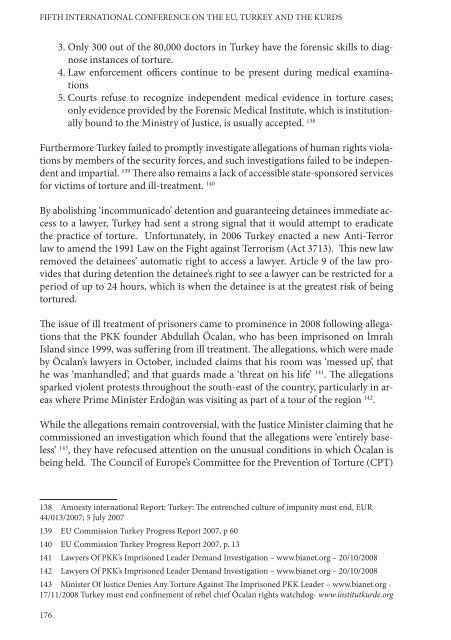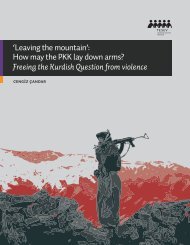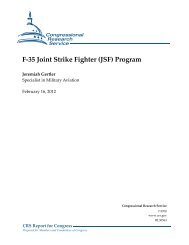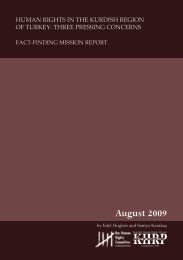FIFTH INTERNATIONAL CONFERENCE ON THE EU TURKEY AND THE KURDS
fifth international conference on the eu, turkey and the kurds
fifth international conference on the eu, turkey and the kurds
Create successful ePaper yourself
Turn your PDF publications into a flip-book with our unique Google optimized e-Paper software.
<strong>FIFTH</strong> <strong>INTERNATI<strong>ON</strong>AL</strong> <strong>C<strong>ON</strong>FERENCE</strong> <strong>ON</strong> <strong>THE</strong> <strong>EU</strong>, <strong>TURKEY</strong> <strong>AND</strong> <strong>THE</strong> <strong>KURDS</strong><br />
3. Only 300 out of the 80,000 doctors in Turkey have the forensic skills to diagnose<br />
instances of torture.<br />
4. Law enforcement officers continue to be present during medical examinations<br />
5. Courts refuse to recognize independent medical evidence in torture cases;<br />
only evidence provided by the Forensic Medical Institute, which is institutionally<br />
bound to the Ministry of Justice, is usually accepted. 138<br />
Furthermore Turkey failed to promptly investigate allegations of human rights violations<br />
by members of the security forces, and such investigations failed to be independent<br />
and impartial. 139 There also remains a lack of accessible state-sponsored services<br />
for victims of torture and ill-treatment. 140<br />
By abolishing ‘incommunicado’ detention and guaranteeing detainees immediate access<br />
to a lawyer, Turkey had sent a strong signal that it would attempt to eradicate<br />
the practice of torture. Unfortunately, in 2006 Turkey enacted a new Anti-Terror<br />
law to amend the 1991 Law on the Fight against Terrorism (Act 3713). This new law<br />
removed the detainees’ automatic right to access a lawyer. Article 9 of the law provides<br />
that during detention the detainee’s right to see a lawyer can be restricted for a<br />
period of up to 24 hours, which is when the detainee is at the greatest risk of being<br />
tortured.<br />
The issue of ill treatment of prisoners came to prominence in 2008 following allegations<br />
that the PKK founder Abdullah Öcalan, who has been imprisoned on İmralı<br />
Island since 1999, was suffering from ill treatment. The allegations, which were made<br />
by Öcalan’s lawyers in October, included claims that his room was ‘messed up’, that<br />
he was ‘manhandled’, and that guards made a ‘threat on his life’ 141 . The allegations<br />
sparked violent protests throughout the south-east of the country, particularly in areas<br />
where Prime Minister Erdoğan was visiting as part of a tour of the region 142 .<br />
While the allegations remain controversial, with the Justice Minister claiming that he<br />
commissioned an investigation which found that the allegations were ‘entirely baseless’<br />
143 , they have refocused attention on the unusual conditions in which Öcalan is<br />
being held. The Council of Europe’s Committee for the Prevention of Torture (CPT)<br />
138 Amnesty international Report: Turkey: The entrenched culture of impunity must end, <strong>EU</strong>R<br />
44/013/2007; 5 July 2007<br />
139 <strong>EU</strong> Commission Turkey Progress Report 2007, p 60<br />
140 <strong>EU</strong> Commission Turkey Progress Report 2007, p. 13<br />
141 Lawyers Of PKK’s Imprisoned Leader Demand Investigation – www.bianet.org – 20/10/2008<br />
142 Lawyers Of PKK’s Imprisoned Leader Demand Investigation – www.bianet.org – 20/10/2008<br />
143 Minister Of Justice Denies Any Torture Against The Imprisoned PKK Leader – www.bianet.org -<br />
17/11/2008 Turkey must end confinement of rebel chief Öcalan rights watchdog- www.institutkurde.org<br />
176





